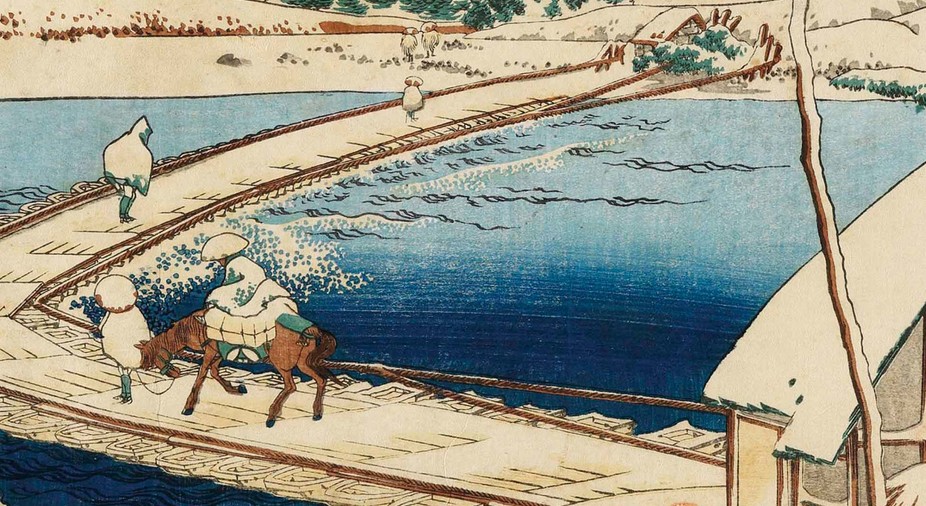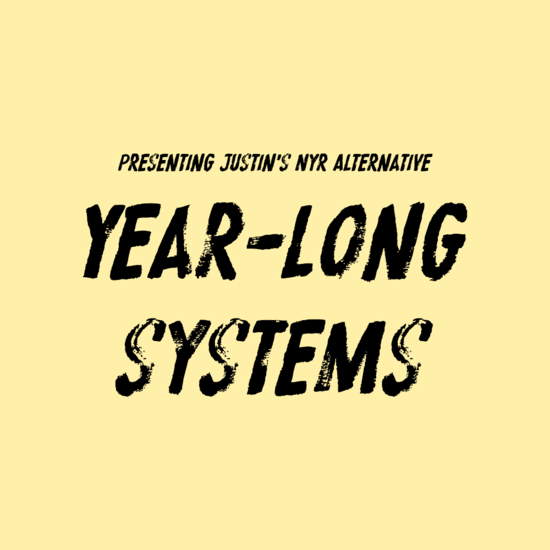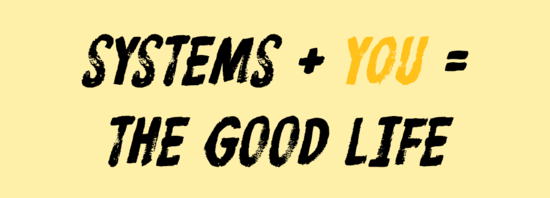
Happy New Year!
I imagine after a holiday with plentiful supplies of bucks fizz, panettone and Christmas jazz music, you’re truly ready to start the new year off with high spirits! This refreshing feeling is likely to come paired with a powerful surge of motivation, begging you to take a look at the year ahead as an opportunity to recreate yourself through the means of developing a new skill or habit. However, the usual strategy you may have previously relied on to do just this: has failed you and will continue to do so.
I am of course talking about: New Years Resolutions.
The official definition of ‘resolution’ reads: ‘a firm decision to do or not to do something’ and yet there seems to be very little that is firm about this decision. The goal we set for ourselves seems flimsy and blindly optimistic at best. It seems that almost by their very nature, New Years Resolutions (NYRs from now on) offer very little chance of successful completion. To demonstrate this, think of what is most likely to be the most popularly affirmed NYR by the hungover and turkey-stuffed hopefuls of each year: to be healthier.
Whilst January offers your local gyms and green smoothie spots a swarming army of newly motivated folk in harshly-gifted-Christmas-present-training-gear, February presents very few remaining soldiers.
Also what I’ve realised, is that whilst February already shows a huge dip in the number of people continuing their self-proclaimed journey of change, the term ‘New Years Resolution’ is barely brought up in conversation any other time of the year. It is as though we focus heavily on it only during the time we feel like we need to focus on it. In fact, mentioning such a concept during the middle of summer would make you the strange outlier – despite the fact that most of the grown men at your bbq party would be drinking Pimms whilst wearing brightly coloured Hawaiian shirts and sandals over their socks. That’s right, you’re the oddball.
And I think herein lies the problem: NYRs provide no infrastructure or means of sustaining this new commitment throughout the year and even dismisses any reattempt via the temporary attitude it carries with it.
Instead, I now rely on what I think is a far better means of changing, progressing and building a lifestyle which prioritises the things that matter to me most: Year-Long Systems. To tell you about why I may be the right kind of person to be introducing a NYR alternative to you: I have to tell you about how I am the right kind of crazy.
In the past few years, I have set myself ambitious challenges at the start of each year (see how I’m doing everything to avoid saying that they were NYRs) and somehow managed to complete them to a degree that my stupidly-high-standard self could somewhat smirk at. Two of these challenges were:
- Waking up at 5 in the morning as much as possible (admittedly I did say ‘everyday’ at first, but once the New Years Eve-induced hangover subsided, my more rational mind altered the wording slightly… forgive me!)
- Not drinking any alcohol for an entire year
To update you on waking up at 5 am: I am still doing exactly this, although now with far deeper intent than simply challenging myself. This habit has proved to become one of my staple means of performing at my optimum self.
As for the reasoning for not drinking any alcohol for a year: this was rooted in my personal disdain for my drunken self and for the desire of truly being able to enjoy things in a much more sober state – which I must say, humbly, I am a fricking master at!
From this experience, I’ve been able to detect what specifically allowed me to develop varying habits and skills without failing, for which I am now extremely grateful and proud of myself for. From here, I’ve created a more organised process which I previously mentioned as: Year-Long Systems (YLS from now on).

To start building your own YLS, you must first create a Not-To-Do List. This is a list for which you focus not on what you need to do, but what you need to stop doing. The holidays likely gave you time to reflect positively over the year’s events over a slice of stollen – I’m giving you time to be more brutal in your reflection.
Think honestly about your habits, behaviours and even about the way you think. Think deeply about the types of these things which: negatively affect your lifestyle, don’t provide any real impact or deep fulfilment, and/or prevent you from doing what you wish to be spending more time on. Write down a list of everything that comes to mind. (You can do this on any kind of paper or notebook, although preferably a document you can save on y0ur desktop as you will need to have access to this list throughout the year).
It is worth noting this quote from writer, Johann Wolfgang von Goethe:
Things which matter most must never be at the mercy of things which matter least.
Much like stripping the wall of its old and worn-out wallpaper before applying a more aesthetically appropriate one when redecorating, a Not-To-Do List attempts to erase any bad habits, behaviours and mindsets that you wish to leave in the previous year as you curate your new ones on a blank canvas-like, wall. This also places you in a psychological state to closely evaluate the things which you may not have realised you routinely do, that unfortunately bring your life very little impact or happiness. From here, you’ll be able to create systems for yourself that are more purposeful and deeply impactful.
After you have done this, you can begin devising the first of the three systems you will put in place for your future self. This first system is:

Working straight off the back of the Not-To-Do List, it is extremely important to set limits for yourself. I learnt this from the year in which I challenged myself to not drink alcohol for a year. Whilst extreme, it meant that there was a system put in place for me to rely upon rather than have to make a decision during times when I may be least likely to think rationally.
To really dive deep using this example; in times when I could think and debate with friends who are 3 gin and tonics down about whether I would join them on their next round or not, I could allow the limit that the most rational and long-term-happiness-orientated version of me had previously set. Then, after excusing myself from the round, I would align my focus on having a good time rather than having any second guesses or doubts about my decision – unless of course, you have the kind of friends who don’t respect or understand your adult decision. (If you do, ditch them. There are far better friends to be had – its the least you deserve).
Basically, in most moments (like being at the bar) you have very little internal power over the decision that you previously knew would be best for you. So create a list of limits for yourself and aggressively stick to them throughout the year.
(Side-note, I found that year so powerfully impactful in terms of my career and life progress that I’ve set up a limit system for myself, in 2019, to only have one drink in a night and to only have that one glass once a week at most. I enjoy Malbec wine far too much to go cold turkey again).

Now that you know what not-to-do and how to prevent yourself from reacting in the moment rather than working off a well thought-out strategy, you need to choose the habits you want yourself to have built into your new year-long routine. I call this system section habits rather than skills because even if you are aiming to learn a skill, it’ll require you to build a habit of learning and so it is good to frame your list item down as a habit you want to upkeep. For example, writing ‘practice guitar for 30 minutes everyday’ rather than ‘become good at guitar’. This kind of habit-focused thinking will provide you with a more tanglible means of holding yourself accountable. To quote author Tim Ferriss: “life punishes the vague wish and rewards the specific ask”.
In case you are finding yourself uninspired to think of what habits to build and focus on throughout the year, I find thinking about and asking myself these questions help me put down some great ideas for myself:
- What new skill, when deeply studied and mastered, would help me advance in my career faster than I have previously projected?
- What new habit or skill would enable me to be more creatively challenged and thus, inspired?
- What new skill would enable me to connect with and learn from something/someone that I previously couldn’t? (Learning the language that your grandmother can only converse in is a great habit).
You’ll notice that all of these questions tap into a very personal and introspective nature. I do not want to encourage any habit forming from the basis of wanting to impress others or making others proud. I believe these more external motivations have a far less sustainable value to them and so I want to instead encourage a more self-reliant way of thinking – which will provide endless value to your growth. (I realise that the one about language does include another individual, but the intention here is for you to be able to learn from that which you could not previously – your grandmother being happy is simply a beautiful cherry on the top).
When it comes to listing your habits, rather than just writing one line per item, try to write some thoughts behind each habit. Build a foundation of thought for you to build your habits on top of as you may have some deeply personal motivations as to why you want to develop this. Writing those thoughts out will prove to be useful upon moments of resistance as you will have an arsenal of motivating reminders of why you started.

Armed with your limits and habits, you can now set off on your year-long adventure knowing that you are more likely to fulfil what you have set out to achieve than any previous attempt. However, much like the long adventure that took the Hobbits to Mordor’s Mount Doom, you too will need a Wizard. An experienced voice of reason that has collected wisdom from the many adventures before. In the YLS, rather than having Gandalf providing such wisdom to keep you on the right path, you will have your own principles. At first, I considered calling this part the ‘rules’ but came to the realisation that this should guide you without necessarily restricting you to discover more, learn and adapt your way of thinking to further your ambitious pursuit. Instead, I opted for Principles as it allows for that exact kind of fluidity.
Whilst a lot of principles taught by philosophers and other great thinkers throughout history have provided powerful and universally applicable wisdom, much like you have done with every other stage of the YLS, you must think inwardly and find what is true to you in the most rational and honest way possible. Give yourself no excuses and provide yourself with the kind of guiding hand that will assist you in less certain times.
If you need a structure to create great principles for yourself, here are a few that work well for me:
- ‘If _____ happens, I will do _____’.
- ‘Make decisions based on _____’.
- ‘Always _____ when _____’.
- ‘When feeling _____, try doing _____’.
- ‘Make sure to keep _____’.
Much like the limits you set for yourself, these principles should lean toward helping you develop habits and skills that prioritise the things that are most important to you. For this reason, you should really aim to write these principles out without speaking to anyone, who may end up influencing your thinking.

With these three parts combined, you now have YLS that will allow your best possible self to exist. With a more continuous approach when thinking about your habits, you should be able to see yourself building momentum in terms of thinking, habit building and goal achieving. Much like compound-interest when investing, you will see your own habits compounding over time, providing a lifestyle which may be unrecognisable in a year’s time. Then, the foundations upon which you’ll be building next YLS for the following year will really make you smile. To hit at a deeper meaning as to why habits are so powerful, I want to leave you with a quote from James Clear, author the book ‘Atomic Habits’:
Habits are the way you embody identity. True behaviour change is really identity change.
Happy New Year and good luck to you on your next year of powerful change!

